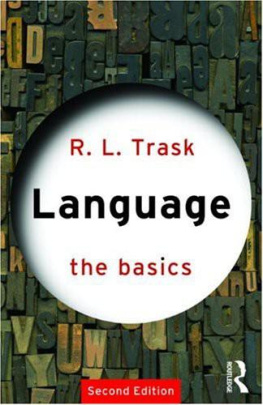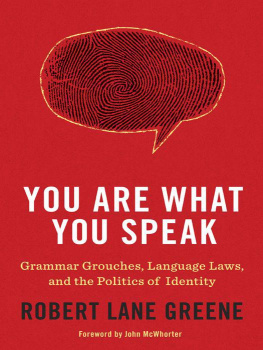TALK on the WILD SIDE
Lane Greene writes the Johnson column about language for The Economist. His book about the politics of language, You Are What You Speak: Grammar Grouches, Language Laws, and the Politics of Identity, was published by Delacorte Press in 2011.
TALK on the WILD SIDE
Lane Greene

Published under exclusive licence from The Economist by
Profile Books Ltd
3 Holford Yard
Bevin Way
London WC1X 9HD
www.profilebooks.com
Copyright The Economist Newspaper Ltd, 2018
Text copyright Lane Greene, 2018
All rights reserved. Without limiting the rights under copyright reserved above, no part of this publication may be reproduced, stored in or introduced into a retrieval system, or transmitted, in any form or by any means (electronic, mechanical, photocopying, recording or otherwise), without the prior written permission of both the copyright owner and the publisher of this book.
The greatest care has been taken in compiling this book. However, no responsibility can be accepted by the publishers or compilers for the accuracy of the information presented.
Where opinion is expressed it is that of the author and does not necessarily coincide with the editorial views of The Economist Newspaper.
While every effort has been made to contact copyright-holders of material produced or cited in this book, in the case of those it has not been possible to contact successfully, the author and publishers will be glad to make amendments in further editions.
A CIP catalogue record for this book is available from the British Library
eISBN 978 1 78283 338 3
For my mother, Sharon Lane Greene
Contents
Introduction: The Case of the Missing Whom
SHERLOCK DEPICTS THE WORLDS most famous fictional detective as to be blunt a bit of a prig. On the BBC show, Benedict Cumberbatchs Sherlock Holmes is curt with those not as smart as he is, which is everyone. Cumberbatch is talented and charming, but I still find his Sherlock tiring.
The third episode opens in a jail in Minsk. Holmes is interviewing a man accused of murdering his wife, and he is begging Holmes to take his case. The man speaks British English with a working-class accent and grammar. As he pleads with Sherlock to help him, Sherlock gets as fed up with him as I do with Sherlock.
Man: Shes always getting at me, saying I werent a real man.
Sherlock: Wasnt a real man.
At this point, I rewound the video to see if I had heard rightly. Did Sherlock really just correct his grammar? Yes, on second viewing, he had. The sequence goes on:
Guy: Me old man was a butcher, and he learned us how to cut up a beast
Sherlock: Taught
Now the poor guy is losing his nerve.
Guy: Then I done it
Sherlock: Did it
Undone by Sherlocks hectoring, he breaks down, and confesses: he has repeatedly stabbed his wife. Sherlock wants no part of representing a murderer. He saunters out. As he does, the man makes one last plea:
Guy: Without you, Ill get hung for this.
Sherlock: No, not at all.
At this point, theres a long pause, and a tight shot on Sherlocks smirk: Hanged, yes.
and cue the title music, giving the audience another minute to think on the fact that Sherlocks grammatical precision is part of his uncompromising brilliance.
When the title sequence is over, the very next scene takes place in the apartment Sherlock shares with John Watson, played by a hangdog Martin Freeman. Watson is chiding Sherlock for his lack of practical knowledge about the world. Sherlock, lying on the couch and bored by the conversation, says, It doesnt matter to me whos prime minister, or whos sleeping with who.
Once again I grabbed my remote and rewound, to my wifes annoyance. Had Sherlock really said whos sleeping with who?
My wife has what we call HBO brain. In those long multi-season shows with dozens of characters, she can remember whos in love with whom, whos betrayed whom, who has an alliance with whom and so on. I cant, and Im constantly asking her to tell me whats going on. Her ability to keep all the characters motivations in her head helps her make sensible predictions about whats going to happen. I am just carried along by the stream, vaguely confused the whole time.
So when I spotted Sherlocks whos sleeping with who I thought, aha! Ive noticed a clue, and my wife has missed it. The pre-title-sequence scene had shown Sherlock to be an uncompromising grammatical pedant. And just a minute later, hes saying whos sleeping with who rather than the standard formal English whos sleeping with whom. I just knew that this lack of whom was going to come up later in the plot.
And it just never did. It was an oversight. The writers had spent two solid screen minutes setting Sherlock up as a man so unbending in his grammar that he will taunt a man fearing a date with the hangman. But those same writers didnt even notice the Case of the Missing Whom.
Who murdered whom? For some readers, the answer will be simple: it was the middlebrow intellectuals in the writers room, and the murder weapon was the drop in grammatical standards in schools since the 1960s. For the many educated, intelligent and thoughtful people who worry about the state of the English language, the omission of whom in an expensively produced, high-end BBC show is not just a minor oversight on a television show. It is serious business. Well-educated writers at a prestigious institution, even a national crown jewel like the BBC, are abusing a core feature of English grammar. And other people foreigners, the young (the children!) are watching. They learn the prestige form of English from the BBC; indeed BBC English used to be synonymous with a high standard. If the writers of Sherlock are allowed to get away with murdering whom, something valuable clarity, precision, logic in the next generation will be lost.
For the worriers, the story of whom goes like this: once upon a time, schoolchildren learned not just English but Latin grammar. They knew that words have a feature called case. Case distinguishes the subject of a sentence from the objects. In Latin, all nouns have an ending that shows their case. In English, only the pronouns do. He is in the nominative case, for a subject. Him is in the objective, for a direct or indirect object.
Who is also a pronoun, and like he, it is in the nominative case. Its objective form is whom: You saw whom? Shes sleeping with whom? For a certain kind of English-speaker, saying (as Sherlock did) whos sleeping with who, neglecting that case ending, betrays a drop in care and attention to the crucial relationships in a statement. Its critical to know which word is the subject of a sentence, and which is the object.
But how does Watson react to Sherlock? Is he confused by whos sleeping with who? Of course not. Watson, like the writers and the vast majority of the viewers, simply didnt notice. That is not because he has low standards, too. Watson (like the viewer) understood perfectly well what Holmes meant. So here we come to the real mystery: if whom is so important, why is there no difficulty whatsoever understanding a sentence that omits it?
This is because there are two overlapping ways to communicate whats a subject and whats an object in English. One is case: the difference between
Next page











